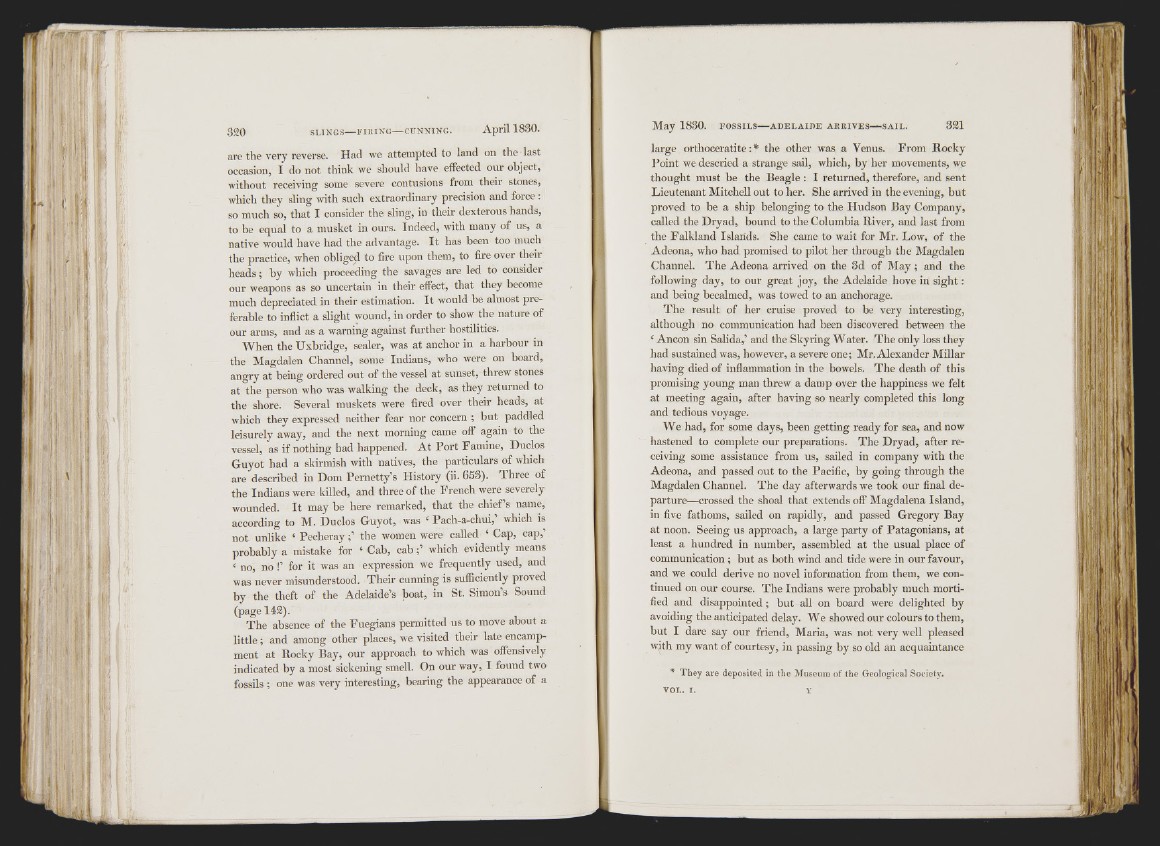
April 1830.
are the very reverse. Had we attempted to land on the last
occasion, I do not think we should have effected our object,
without receiving some severe contusions from their stones,
which they sling with such extraordinary precision and force :
so much so, that I consider the sling, in their dexterous hands,
to be equal to a musket in ours. Indeed, with many of us, a
native would have had the advantage. It has been too much
the practice, when obliged to fire upon them, to fire over their
heads; by which proceeding the savages are led to consider
our weapons as so uncertain in their effect, that they become
much depreciated in their estimation. It would be almost preferable
to inflict a slight wound, in order to show the nature of
our arms, and as a warning against further hostilities.
When the Uxbridge, sealer, was at anchor in a harbour in
the Magdalen Channel, some Indians, who were on board,
angry at being ordered out of the vessel at sunset, threw stones
at the person who was walking the deck, as they returned to
the shore. Several muskets were fired over their heads, at
which they expressed neither fear nor concern ; but paddled
leisurely away, and the next morning came off again to the
vessel, as if nothing had happened. At Port Famine, Duclos
Guyot had a skirmish with natives, the particulars of which
are described in Dom Pernetty’s History (ii. 653). Three of
the Indians were killed, and three of the French were ^severely
wounded. It may be here remarked, that the chief’s name,
according to M. Duclos Guyot, was ‘ Pach-a-chui,’ which is
not unlike ‘ Pecheray ;’ the women were called ‘ Cap, cap,’
probably a mistake for ‘ Cab, cab;’ which evidently means
‘ no, no !’ for it was an expression we frequently used, and
was never misunderstood. Their cunning is sufficiently proved
by the theft of the Adelaide’s boat, in St. Simon’s Sound
(page 142).
The absence of the Fuegians permitted us to move about a
little; and among other places, we visited their late encampment
at Rocky Bay, our approach to which was offensively
indicated by a most sickening smell. On our way, I found two
fossils ; one was very interesting, bearing the appearance of a
large orthoceratite: * the other was a Venus. From Rocky
Point we descried a strange sail, which, by her movements, we
thought must be the Beagle: I returned, therefore, and sent
Lieutenant Mitchell out to her. She arrived in the evening, but
proved to be a ship belonging to the Hudson Bay Company,
called the Dryad, bound to the Columbia River, and last from
the Falkland Islands. She came to wait for Mr. Low, of the
Adeona, who had promised to pilot her through the Magdalen
Channel. The Adeona arrived on the 3d of May ; and the
following day, to our great joy, the Adelaide hove in sight:
and being becalmed, was towed to an anchorage.
The result of her cruise proved to be very interesting,
although no communication had been discovered between the
‘ Ancon sin Salida,’ and the Skyring Water. The only loss they
had sustained was, however, a severe one; Mr. Alexander Millar
having died of inflammation in the bowels. The death of this
promising young man threw a damp over the happiness we felt
at meeting again, after having so nearly completed this long
and tedious voyage.
We had, for some days, been getting ready for sea, and now
hastened to complete our preparations. The Dryad, after receiving
some assistance from us, sailed in company with the
Adeona, and passed out to the Pacific, by going through the
Magdalen Channel. The day afterwards we took our final departure—
crossed the shoal that extends off Magdalena Island,
in five fathoms, sailed on rapidly, and passed Gregory Bay
at noon. Seeing us approach, a large party of Patagonians, at
least a hundred in number, assembled at the usual place of
communication ; but as both wind and tide were in our favour,
and we could derive no novel information from them, we continued
on our course. The Indians were probably much mortified
and disappointed; but all on hoard were delighted by
avoiding the anticipated delay. We showed our colours to them,
but I dare say our friend, Maria, was not very well pleased
with ray want of courtesy, in passing by so old an acquaintance
* They are deposited in the Museum of the Geological Societj'.
VOL. I . Y